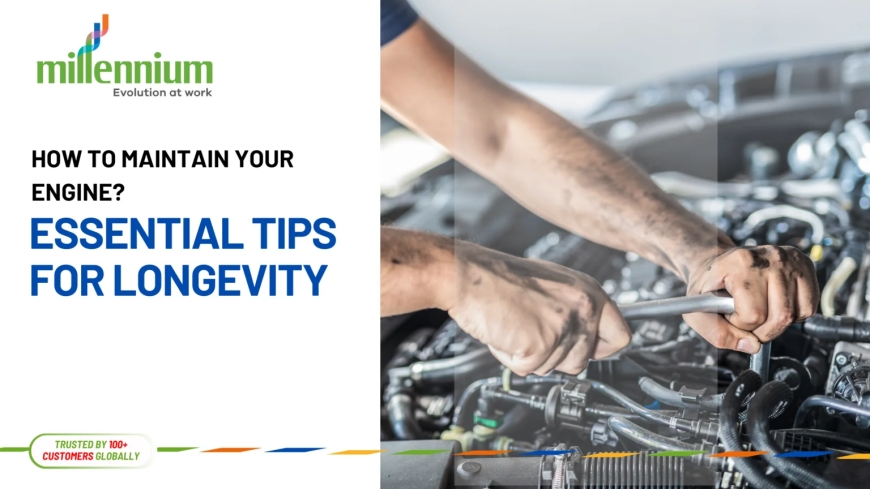How to Maintain Your Engine: Essential Tips for Longevity
Your vehicle’s engine is the heart of its performance. Just like any complex machine, it requires regular care to function efficiently over time.

Your vehicles engine is the heart of its performance. Just like any complex machine, it requires regular care to function efficiently over time. Proper engine maintenance not only extends the life of your car but also ensures better fuel efficiency, safety, and lower repair costs in the long run. Whether you're driving a brand-new car or an older model, these essential tips will help keep your engine running smoothly for years to come.
Why Engine Maintenance is Important
Neglecting engine maintenance can lead to poor performance, increased emissions, and costly breakdowns. A well-maintained engine provides:
-
Better fuel economy
-
Improved performance
-
Reduced risk of unexpected failures
-
Lower emissions
-
Increased resale value
Regular engine maintenance helps identify minor issues before they escalate into major problems, ensuring your vehicle remains reliable and safe on the road.
Key Engine Maintenance Tasks
Here are some essential engine maintenance tasks every vehicle owner should prioritize:
1. Regular Oil Changes
Engine oil lubricates moving parts and reduces wear. Over time, it breaks down and becomes less effective. Check your owners manual for the recommended interval, typically every 5,000 to 10,000 kilometers, and never delay oil changes.
2. Replace Air Filters
Clean air is vital for combustion. Dirty air filters reduce engine efficiency and increase fuel consumption. Replace them every 12,000 to 15,000 kilometers or as recommended.
3. Inspect Belts and Hoses
Timing belts, serpentine belts, and coolant hoses are critical for engine function. Look for signs of wear, cracks, or fraying and replace them according to the maintenance schedule.
4. Maintain the Cooling System
An overheating engine can result in serious damage. Keep the coolant topped up and replace it periodically to prevent corrosion and buildup in the radiator.
5. Check and Replace Spark Plugs
Spark plugs ignite the fuel-air mixture in your engine. Worn plugs can lead to poor fuel efficiency and starting issues. Replace them at the intervals specified in your manual.
6. Battery Maintenance
Corrosion, weak terminals, and old age can affect battery performance. Clean terminals and test your batterys charge regularly to avoid getting stranded.
Tips for Everyday Engine Care
In addition to scheduled maintenance, practicing good driving habits can significantly preserve engine life. Simple engine maintenance tips like warming up your car before driving, avoiding aggressive acceleration, and keeping fuel levels above a quarter tank can make a big difference.
-
Warm Up Before Driving: Especially in cold weather, let your engine run for a minute before moving to allow oil to circulate.
-
Avoid Aggressive Driving: Rapid acceleration and hard braking put extra strain on the engine and transmission.
-
Dont Ignore Warning Lights: The check engine light indicates something needs attention. Get it diagnosed promptly.
-
Keep Fuel Above a Quarter Tank: Low fuel levels can cause sediment to clog fuel injectors and pumps.
-
Drive Regularly: Letting a car sit idle for too long can cause moisture buildup and battery drain.
Preventive Maintenance Checks
Routine checks go a long way in preventing unexpected issues:
-
Oil Level: Check using the dipstick every few weeks. Top up if necessary.
-
Coolant and Brake Fluid: Monitor levels and top up with the appropriate fluid.
-
Tire Pressure: Improperly inflated tires can impact performance and engine load.
-
Leaks: Regularly inspect the engine bay for any signs of oil or fluid leaks.
-
Engine Noise or Vibrations: Listen for unusual sounds during startup or driving.
When to Seek Professional Help
While some tasks can be done at home, there are times when expert help is necessary:
-
Overheating Issues: Persistent overheating can indicate thermostat, radiator, or head gasket problems.
-
Poor Engine Performance: Stalling, sluggish acceleration, or unusual noises need professional inspection.
-
Smoke from the Exhaust: Blue, white, or black smoke can signify burning oil or coolant leaks.
-
Persistent Check Engine Light: A diagnostic scan at a certified workshop can pinpoint the issue.
Regular visits to a certified mechanic ensure your engine gets professional care and timely repairs.
Common Mistakes to Avoid in Engine Maintenance
Avoiding these common mistakes can save your engine from premature wear:
-
Skipping Oil Changes: Delaying oil changes leads to sludge buildup and engine damage.
-
Using Wrong Oil Type: Always use oil that meets your vehicles specifications.
-
Neglecting Minor Issues: Small leaks or noises often lead to bigger problems if ignored.
-
Overfilling Fluids: Too much oil or coolant can harm seals and gaskets.
-
DIY Repairs Without Knowledge: Incorrect repairs can cause more harm than good. Consult a mechanic when in doubt.
Conclusion
Maintaining your engine doesnt have to be complex, but it does require consistency and awareness. From routine oil changes to preventive checks and mindful driving, these practices ensure your engine stays healthy and your vehicle reliable. An investment in regular engine maintenance is an investment in your vehicles longevity, performance, and safety. Stay proactive, and your engine will reward you with smooth, worry-free driving for many kilometers ahead.




































